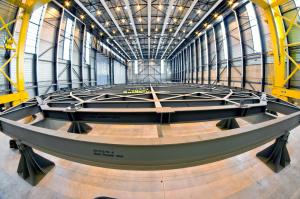The 'frame' is ready, welding can begin
11 Jul 2016
It is no news that the ITER Tokamak will be large ... very large. But "large" can remain an abstraction until you are given the chance to see some of the equipment and tools that will be implemented in its construction.
Another two steel frames will be necessary to support components, jigs and fixtures during the cryostat assembly process. The circular assembly platforms (34 metres in diameter) will also act as transporters for the completed cryostat sections.
One of these pieces of equipment has just been assembled in the Cryostat Workshop—a circular steel frame that will support the cryostat base segments during welding operations.
The frame's diameter is 34 metres—four metres more than that of the cryostat in order to provide sufficient room for workers and welding machines. In the 44-metre wide Cryostat Workshop, the presence of such a large steel structure is overwhelming. Its sheer size dwarfs the men who were responsible for its assembly.
"We'll position the 60° segments of tier 1 on the frame and then align them using laser metrology," explains Vaibhav Joshi of ITER India. "Once tier 1 is welded, we will do the same with the 'rim' (tier 2). Welding operations will begin at the end of this month and last for about a year and a half, until the end of 2017."
The cryostat segments, manufactured by Larsen & Toubro Ltd, are part of India's in-kind procurement contributions. Indian contractor MAN Diesel & Turbo (Germany) will be in charge of welding operations. Once completed, the cryostat base section will weigh 1,250 tonnes ─ the single largest load of the machine assembly.
Still resting on its support frame, the base section will travel out of the workshop and into temporary storage on a self-propelled transport vehicle (SPMT).
Cryostat pre-assembly operations will then progress for the next sections (lower and upper cylinders) on two new frames. Once the base section is installed in its permanent position in the Tokamak Pit, its frame will be re-used for the final piece of the cryostat—the top lid.


